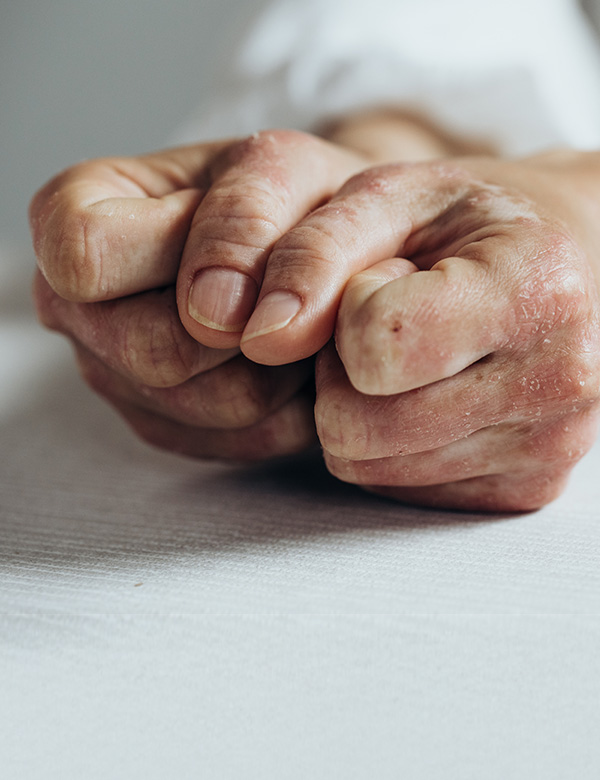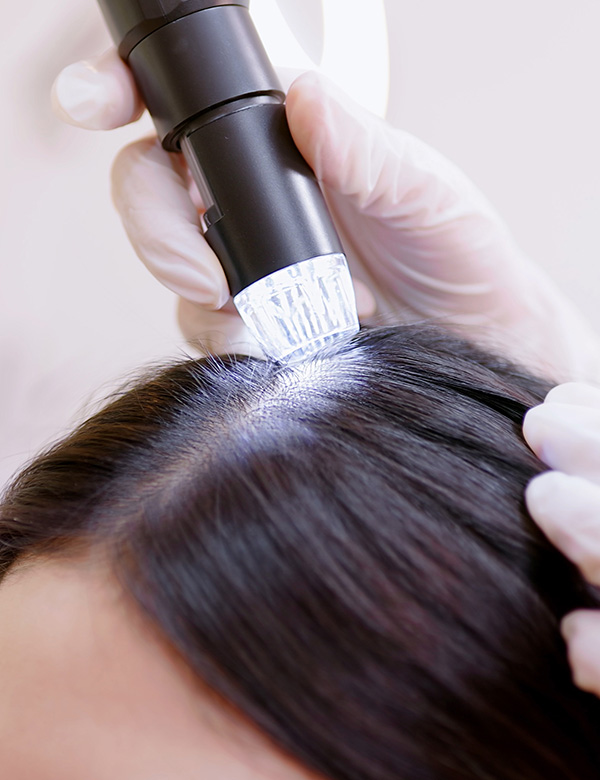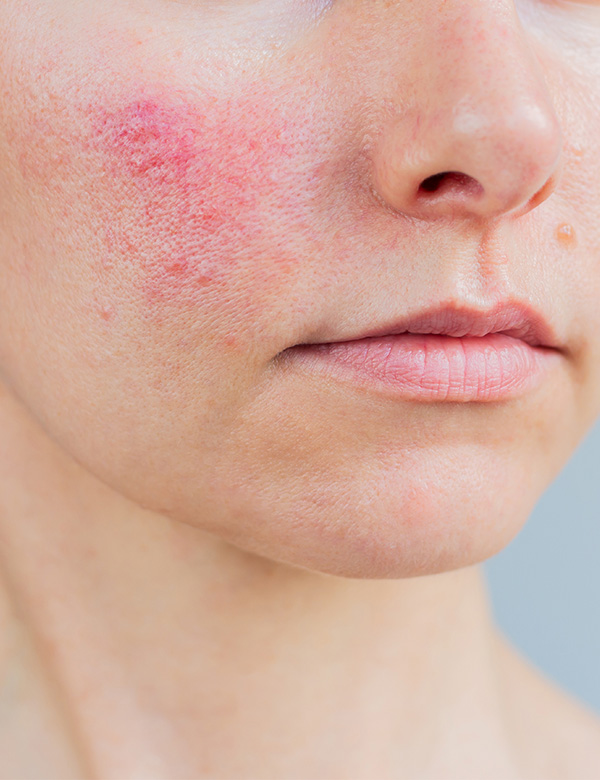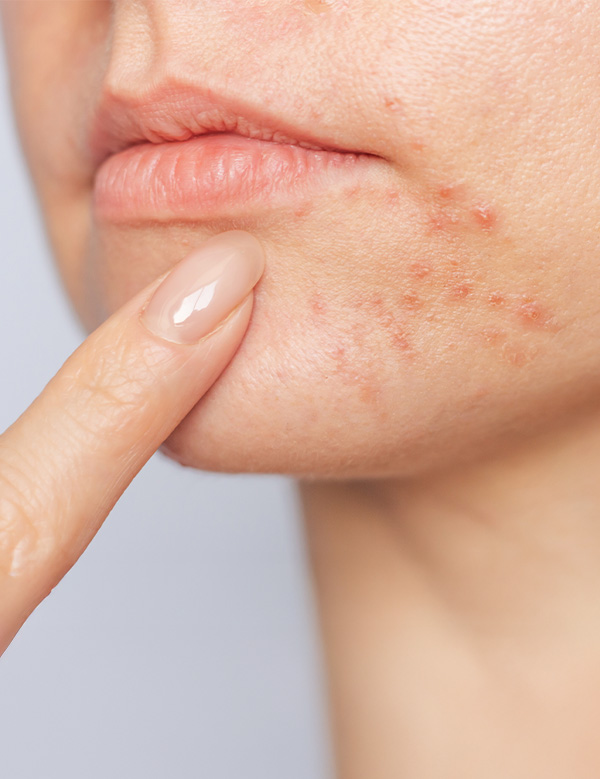Eczema
Diagnosis and treatment of eczema (dermatitis) – by experienced dermatologists at Derma Medical Clinic in Zurich – Sihlcity
Eczema
Chronische Abszesse und schmerzhafte Knoten durch erfahrenen Hautarzt abklären und behandeln in der Derma Medical Clinic in Zürich - Sihlcity
Skin rash, itching, flaky skin and inflammatory skin changes – diagnosis and treatment with medical creams, light therapy, and personalized skincare advice
Examinations
Dermatological examination
Allergy tests, swabs for pathogen detection, UV diagnostics if needed
Process
Initial consultation
Skin analysis
Duration
approx. 20–30 minutes
What is eczema?
Eczema is an inflammatory skin condition that causes redness, itching, oozing or flaking. Affected areas are often sensitive, cracked or tight – sometimes small blisters or crusts can appear.
There are different types, such as allergic contact eczema, atopic eczema (also called neurodermatitis), or chronic hand eczema. What they have in common is that the skin has an overreactive response to things it would normally tolerate. This leads to inflammation that should be treated by a doctor.
Eczema should be checked and treated if you …
- have persistent itching or red, flaky skin patches
- often notice inflammatory skin changes on your hands or feet
- think that your symptoms might be caused by skincare products, your job or allergies
- want a clear diagnosis and treatment tailored to your needs

What is eczema?
Eczema is an inflammatory skin condition that causes redness, itching, oozing or flaking. Affected areas are often sensitive, cracked or tight – sometimes small blisters or crusts can appear.
There are different types, such as allergic contact eczema, atopic eczema (also called neurodermatitis), or chronic hand eczema. What they have in common is that the skin has an overreactive response to things it would normally tolerate. This leads to inflammation that should be treated by a doctor.
Who can benefit from an eczema diagnosis and treatment?
Eczema should be checked and treated if you …
- have persistent itching or red, flaky skin patches
- often notice inflammatory skin changes on your hands or feet
- think that your symptoms might be caused by skincare products, your job or allergies
- want a clear diagnosis and treatment tailored to your needs
Treatment
What happens during the exam of redness and rashes?
The dermatologist closely examines the affected skin – if necessary, using a special magnifying lens. If an allergic cause is suspected or your job may play a role, allergy tests or swabs can be added.
The goal is to identify the exact eczema type to start a suitable treatment.
What happens during eczema treatment?
Depending on the findings, different steps may help:
For acute flare-ups, medical creams or ointments reduce itching and redness.
For recurrent or long-lasting eczema, UV light therapy may help and is done right at our clinic. In short sessions, light is gently directed at the affected areas.
UV light can soothe irritated skin: it eases itchiness, slows down fast skin renewal, and gently calms inflammation.
You’ll also get practical skincare tips, daily protection advice and – if relevant – help to avoid potential triggers. Our clinic’s medical skincare team can also support the treatment, especially for sensitive or overtreated skin.
How does eczema treatment work?
Personal consultation and skin analysis
During your first visit, we discuss your symptoms, timeline, and possible causes. The dermatologist examines the affected areas carefully.
Treatment planning
Depending on your condition, we use medical creams, light therapy, or – in rare cases – tablets or injections. We also share helpful skincare advice and tips to avoid triggers.
Treatment start and skin therapy (if needed)
Treatment begins directly at our clinic, for example with the right cream or, if needed, light therapy. Our skin therapist can also assist.
Long-term support
Eczema often comes in phases – that’s why we stay in touch regularly. We track your skin condition, adjust the treatment if needed, and guide you on how to care for and protect your skin long-term.

Treatment of skin rashes (eczema) at Derma Medical Clinic is provided exclusively by experienced dermatology specialists:
- Dr. Benjamin Miller, specialist in dermatology and phlebology
- Dr. Markus Dendorfer, specialist in dermatology and pediatric dermatology
Both have many years of experience in the diagnosis and treatment of eczema – from mild to more severe cases.

Dr. med. Markus Dendorfer
Board-certified Specialist in Dermatology & Venereology FMH

Dr. med. Benjamin Miller
Board-certified Specialist in Dermatology & Venereology FMH
What to expect with us
Years of experience with chronic skin conditions
Our dermatologists have been supporting people with eczema for many years – from first symptoms to long-term improvement. We understand that the condition varies and provide a thorough evaluation.
Modern light therapy (UVB / PUVA) directly in the clinic
Our clinic uses advanced equipment to treat affected skin with UV light. Sessions are conveniently held here with no extra appointments or referrals.
Supportive care from in-house skin therapist
Our medical skincare services can assist when needed – for personalized skincare advice, sensitive skin, or support after flare-ups.
Everything under one roof
You’ll get diagnosis, medical care, and skincare support all in one place. This means clear contacts, short paths, and smooth coordination – from first visit to follow-ups.
Your skin is itchy, flaky or keeps showing red and inflamed areas – and skincare alone isn’t helping?
Book an appointment now for a diagnosis and possible treatment at Derma Medical Clinic in Zurich – Sihlcity.
FAQ – Frequently asked questions about eczema
What is eczema?
Eczema – also called dermatitis – is an inflammatory skin reaction. Common signs include redness, itching, flaking or oozing. It is not an infection, but a reaction or overreaction of the skin – often triggered by outside factors or inherited sensitivity.
How can I recognize eczema?
Eczema usually appears as red, flaky or oozing patches, often with intense itching. Some forms are dry, others more moist – depending on the type and cause.
What types of eczema exist?
Common types include atopic eczema (also known as neurodermatitis), allergic contact eczema, nummular eczema (coin-shaped), and seborrheic eczema, which often affects the scalp.
What causes eczema?
Possible triggers include allergies, irritants (like soaps or cleaning products), dry skin, stress, or a genetic tendency. The cause and course vary with each eczema type – it can be short-term or long-lasting.
Is eczema contagious?
No. Eczema is not contagious – it’s not spread by skin contact or shared items.
How is eczema treated?
Depending on severity, treatment includes medical creams or ointments – sometimes with cortisone. For more severe or long-lasting eczema, light therapy or medication may be needed. Avoiding triggers is also part of treatment.
Which skincare products are good for eczema?
Fragrance-free, rich creams or lotions with soothing ingredients are ideal. Daily, consistent care helps strengthen the skin barrier and reduce symptoms.
What does a skin therapist do, and how is this different from an aesthetician?
A skin therapist (medical aesthetician) specializes in caring for skin problems like acne, rosacea or pigmentation issues. Unlike regular aestheticians, they work closely with dermatologists and use advanced treatments and medical skincare. At Derma Medical Clinic, every procedure is performed by a qualified skin therapist and tailored to your skin’s needs.
Can eczema become chronic?
Yes – especially if the skin is often irritated or triggers are ongoing. With the right treatment and good skincare, flare-ups can usually be managed well.
When should I see a dermatologist for a skin rash?
If symptoms last longer, get worse, or don’t improve with care products, it’s a good idea to see a dermatologist – especially if your hands are affected or symptoms often come back.
What helps with itching in eczema?
Cool compresses, anti-itch creams, and consistent skincare can relieve itching. Try not to scratch – this can make things worse and lead to more inflammation.



